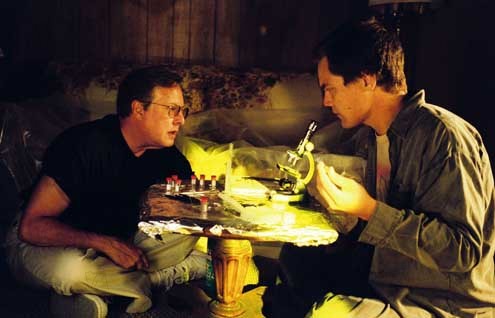This Week Brings All Your Favorites, Including:
- Winter Kills
- Matewan
- Pink Flamingos
- Bug
- …and many more!
Thanks to chart-toppers Miller and scb0212 for contributing this week. Send articles throughout the next week to ploughmanplods [at] gmail, post articles from the past week below for discussion and Have a Happy Friday!
James Grey writes a touching, personal eulogy of William Friedkin for The Hollywood Reporter:
As the years passed, he spoke of his mortality with greater frequency yet without a trace of self-pity. He seemed at peace, and his view of time’s relentless melt had the air of acceptance about it. He was famously confident — many said arrogant — but with me, he often seemed willing to discount his own contributions, calling his work a “quick lunch” compared with the “gourmet dinner” of the directors he admired. He tended to dismiss himself as a mere craftsman, but maybe that’s why he was an artist.
On the subject, at his blog, Filipe Furtado surveys the career of William Friedkin (and provides crucial What The F context regarding Bug):
His sensationalism was based on the desire to get a reaction. One of the most memorable violent screenings I can remember was the first time I saw Bug. The Brazilian distributor released it under the very silly title Possessed and dumped it only on malls in more working-class areas, so there I went to catch it on a Sunday afternoon in a theater full of teenagers and couples ready to watch a horror movie “from the director of The Exorcist”, it was a predictable disaster, the contentious atmosphere as palpable as the movie’s malaise. Somehow I suspect Friedkin would approve, a strong reaction, even a negative one beats a dead theater.
Scott Tobias celebrates cult paranoia thriller Winter Kills at The Reveal on the occasion of a 35mm re-release:
Watching it now is a revelation, like finding some missing piece that unifies two decades’ worth of American political films. To paraphrase another Bridges movie, it’s a rug that really ties the room together. Condon had written the novel The Manchurian Candidate in 1959, adapted into the John Frankenheimer classic three years later, and there’s a strong connection here about the president as a puppet who’s intended to express the will of a wealthy, sinister parent. A host of other films spring to mind, chiefly 1974’s The Parallax View, the greatest of ’70s paranoid thrillers, also about a politician gunned down by a shadowy organization, and Ivan Passer’s 1981 cult noir Cutter’s Way, also starring Bridges, which has a similar shaggy-dog quality. (As it happens, Richert worked with Passer on the scripts for two of his ‘70s comedies, Law and Disorder and Crime and Passion.)
Jeffrey Webb reports on John Sayles’s Matewan from the perspective of the region where the real-life incident happened for Bright Wall/Dark Room:
Visually at times, Matewan resembles a documentary with its use of natural lighting, and the way in which cinematographer Haskell Wexler frames many of his shots. An early tracking shot following a handcar as it passes a row of miners’ shanties looks practically like old newsreel footage. A muted color palette gives the film a faded quality appropriate for both conveying the past and for mirroring the darkness that comes with digging coal underground. The only instance of red just might be when the bloodshed comes. In these moments, Wexler’s camera doesn’t cut away from the violence. To do so would be pulling punches, and Matewan pulls no punches.
It’s Jerk Week at The Ringer! Adam Nayman counts down the best movies made exclusively with jerks for characters and – whaddya know – there’s a healthy percentage of Solute favorites in there:
One of the most gleefully transgressive American movies ever made, John Waters’s Pink Flamingos features a cast of self-styled sociopaths vying for the unofficial but highly coveted title of the “filthiest people alive.” As the eventual undisputed champion, Divine’s outsized outcast Babs Johnson is so hilariously nasty that he carves out his own place in film history. Structured as a kind of inventory of obscenities—with each successive scene raising (or lowering) the bar for bad taste—Pink Flamingos bypassed the MPAA ratings board, and its curiosity factor was instrumental in turning its fledgling independent distributor, New Line Cinema, into the era’s edgiest tastemaker. In a way, “jerk” is either too weak or too harsh a word for Waters’s characters, whose hang-ups and fetishes—including a climactic act of (authentic) shit eating that blurred the line between comic book outrageousness and documentary—run the gamut of the seven deadly sins (and beyond). By tackling so many taboos head-on—and refusing to fully distinguish between toxicity and openhearted idiosyncrasy—Waters and his Baltimore stock company became an unlikely but potent symbol of DIY triumph.
And finally The Defector’s Sean T. Collins checks in on how pro wrestling, a surprisingly inclusive place, is handling America’s latest bout with real-life anti-LGBT heels:
“I would love to be a true heel in the world of professional wrestling,” says Paul Pratt, Pollo’s real-world alter ego. “But it’s ultra-challenging, because the moment I walk through the curtain, people erupt. They know that drag queens are supposed to be sassy and bitchy, so even when I say horrible things to people, they’re like ‘Yass, bitch, read me for filth! The library is open!’ It’s so frustrating. I just called you a piece of trash! You’re not supposed to like it!”


